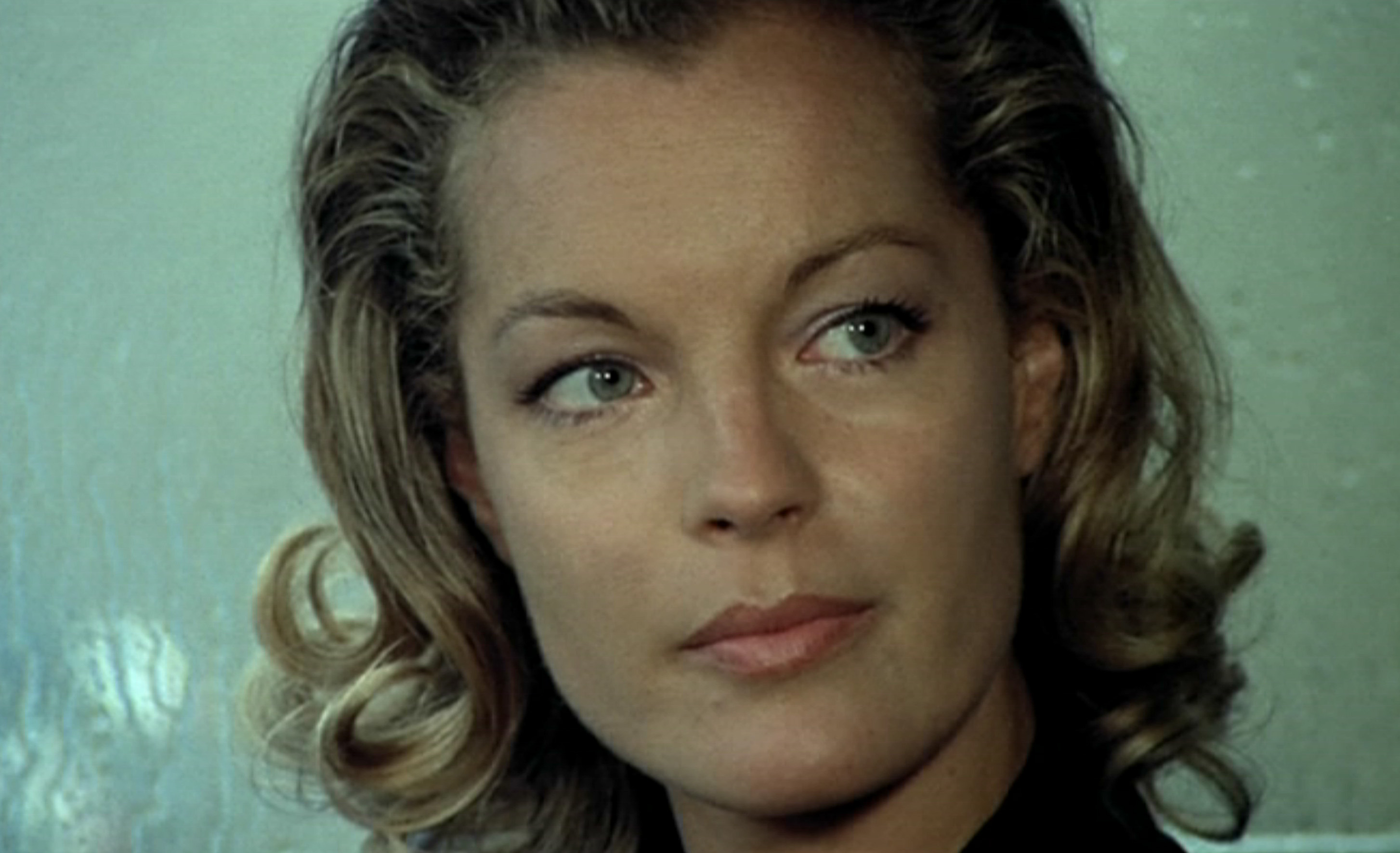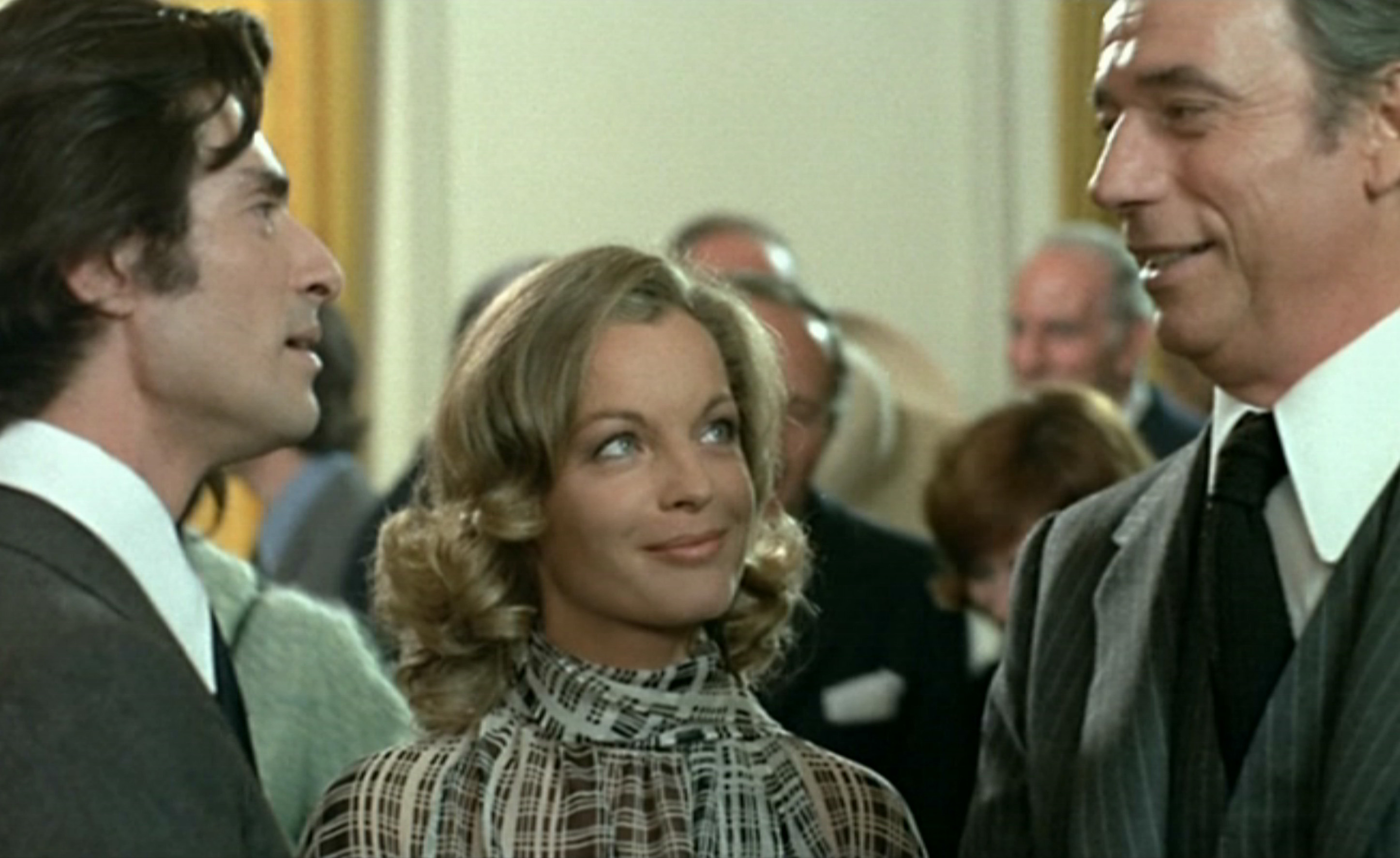Is this a love triangle or the perfect screen bromance? Either way, César et Rosalie is a witty and sophisticated romantic drama about the ebb and flow of relationships between a divorcée and the two very different men in her life.
It’s not just the coiffures and collars that were outsize in 1972. Everything about scrap-metal dealer César (Yves Montand) is big – from his exuberant personality to the cigar that’s often welded to his lip. He’s an unlikely match for the lovely and vivacious Rosalie (Romy Schneider), who usually prefers artistic types, like her ex-husband Antoine. She overlooks César’s sartorial lapses (“yellow” shoes with a dark suit) and lack of sensitivity, because he adores her young daughter and is generous to a fault.
When Rosalie’s ex-boyfriend David (Sami Frey) turns up at a family wedding, the sparks fly. With his saturnine good looks and softly spoken manner, cartoonist David is a threat that must be neutralised. But César’s confidence soon turns to jealousy, then panic and finally rage, as his clumsy machinations drive Rosalie into the arms of the younger man.
We’ve all seen this kind romantic dilemma played out in numerous other films – from vulgar farces to angst-ridden indie dramas. But I’ve rarely seen it handled with the intelligence and subtlety shown by director Claude Sautet and his co-writer Jean-Loup Dabadie. The emotional shifts are reflected by the constant movement of the two male leads – a whirlwind of slamming doors and car journeys undertaken on a whim. When David overtakes César en route to the wedding reception, he’s effectively throwing down the gauntlet to the older man. Later, the road trips grow longer and more contemplative, as César and David evolve from rivals into friends with a shared interest in the mercurial Rosalie.
It’s a risky business trying to make an audience care about a woman who can’t make up her mind over 100 minutes of toing and froing. In the documentary “Serenade for 3” that accompanies this 40th anniversary re-release, surviving members of the crew explain that the role of Rosalie was originally intended for Catherine Deneuve. But Schneider’s warmth plays much better here than Deneuve’s froideur would have done. Her Rosalie is tolerant and even half-amused by César’s tendency to treat her as his personal property – right up to the moment when he tosses her out onto the street.
Sporting a trench coat and wreathed in cigarette smoke, Montand’s César reminded me at times of a Gallic Humphrey Bogart, who’s destined to be disappointed in love. Sautet based the character on his own brother “the talker who never stopped”, though there’s clearly a lot of Montand in there, too. Faced with a rival who veers between impromptu recitals of Bach and smashing up property, Sami Frey wisely opts to underplay the role of David.
Twenty years later Sautet directed Un Coeur en Hiver, another finely wrought drama about two men united and divided by their love for the same beautiful woman. César et Rosalie, with its deft blend of wry humour and romantic drama, feels like the sunnier forerunner to Sautet’s late masterpiece. Both films end on a note of ambiguity, which will suit filmgoers who don’t need their romances to be tied up with a neat, chocolate-box style bow.







June 29, 2014 at 5:45 am
This is a brilliant and very well written review of this motion picture. This is my preferred movie which I have watched over and over for the past 30 years. Perhaps you should have mentioned this incredibly beautiful love letter read by Rosalie to David:
“Ce n’est pas ton silence qui me tourmente, c’est le nom que je lui donne. César sera toujours César. Et toi tu seras toujours David. Qui m’emmène sans m’emporter, qui me tient sans me prendre, et qui m’aime sans me vouloir.”
“Your indifference doesn’t hurt, just the names I give it… Cesar will always be Cesar, and you will always be David… Who leads me without carrying me, who holds me without taking me, and who loves me without wanting me.” (if you have a better translation, please suggest!)
I would like to comment on your last sentence: it took me years to be at peace with the end which I now believe is not ambiguous. It’s not ambiguous because she’s not coming back to choose. And they are not going to fight again. The beauty of Romy Schneider and the happiness on her face to see David and César friendship let me think that they can live peacefully with their past story.
June 29, 2014 at 5:47 am
This is a brilliant and very well written review of this motion picture. This is my preferred movie which I have watched over and over for the past 30 years. Perhaps you should have mentioned this incredibly beautiful love letter read by Rosalie to David:
“Ce n’est pas ton silence qui me tourmente, c’est le nom que je lui donne. César sera toujours César. Et toi tu seras toujours David. Qui m’emmène sans m’emporter, qui me tient sans me prendre, et qui m’aime sans me vouloir.”
“Your indifference doesn’t hurt, just the names I give it… Cesar will always be Cesar, and you will always be David… Who leads me without carrying me, who holds me without taking me, and who loves me without wanting me.” (if you have a better translation, please suggest!)
I would like to comment on your last sentence: it took me years to be at peace with the end which I now believe is not ambiguous. It’s not ambiguous because she’s not coming back to choose. And they are not going to fight again. The beauty of Romy Schneider and the happiness on her face to see David and César friendship lets me think that they can live peacefully with what they shared.
June 29, 2014 at 11:31 am
Hi Gregoire. Thanks for your comment. As a blogger, I can tell you it’s worth receiving hundreds of spam comments just to read one appreciative message like yours.
I’d never even heard of this movie until I wrote my review for the 40th anniversary release. I’ve already watched it another three times, and I suspect it will be one of those films (like The Graduate or The Big Sleep) that never pales with repetition.
On reflection, what I should have said about the final scene is that it’s unclear whether she needs to go further than just observing the men from behind the gate. Does she need to speak to them again or is it enough to see that their friendship has survived?
The letter, I think, is best left in French!
June 29, 2014 at 7:07 pm
I completely agree with you: this love letter should stay in French! I was doing my evangelist job for the English-only readers. English is so much phrasal verb-oriented that it’s chiseled for business but it’s weak to express complex feelings that need instead the widest possible variety of words. Pretentiously, this is the advantage of French – and Italian perhaps too as they share the same Latin roots.
I heard a rumor, never really confirmed but never denied that Pascal Jardin was the ghost writer of the key dialogues of this movie as well as this famous letter. That would make so much sense as Pascal was a crazy person, living furiously, being a lover and embracing life beyond anything you can imagine – the stifling structures of our society doesn’t allow this any more. On the side of being a screenwriter, his real job was to love women and his own in particular. If you speak French, read “Le Zubial” from his worthy son Alexandre to understand what it means to live beyond dreams.
Pascal Jardin said once: “French was formed to express the joy of participating to the world of love”. Q.E.D.
June 29, 2014 at 9:46 pm
I had not heard that rumour about the screenplay (I don’t think it came up in the accompanying documentary on the DVD). But your ‘living furiously’ characterisation of Pascal Jardin perfectly sums up the lives of the central characters in this film and why I love it.
Yes, I do read French (and Spanish), though sadly this is mainly restricted to subtitles these days. Summer is usually my time for catching up on foreign movies, as an antidote to an excess of sport. I think I’ll try to track down a DVD of Les Choses de la Vie, which I’ve wanted to see for a long time . . .